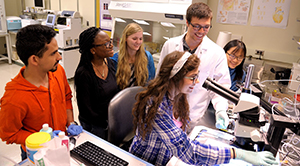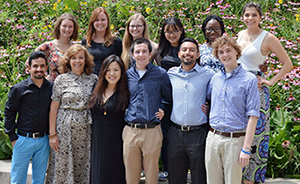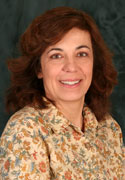At the University of Illinois, the main focus was on bioimaging. Students were chosen from universities nationwide to participate in a 10-week summer program at the Illinois campus.
“We have chosen to focus on bioimaging because we believe undergraduates in different sciences are not exposed enough to this type of methodology and techniques during their undergraduate studies,” said Marina Marjanovic, associate director of the Center for Optical Molecular Imaging and coordinator of the program.

Last summer, students came from the Rose Hulman Institute of Technology, Indiana; Arizona State University; Wentworth Institute of Technology, Massachusetts; the University of Maryland, Baltimore County; Saint Xavier University, Chicago; University of Illinois at Urbana-Champaign; the University of Maryland, and the University of Delaware.
During the first week, students were engaged in “Bioimaging Bootcamp,” which covered general knowledge about the university, as well as biology and imaging through lectures, lab activities, demonstrations, and tours.
“The work I did, and the positive feedback I've gotten from the faculty and graduate students during my time here has served to be completely transformative for me“ --Carlos Renteria, Arizona State University
For the following nine weeks, students engaged in intensive research projects in biological imaging and visualization, closely mentored by a faculty member and graduate student, with assistance from an experienced Illinois undergraduate. Students shared their experiences with their cohort through social activities, research seminars and professional development sessions, and by interacting with other REU programs on campus.
The students found the program to be very rewarding.
“The Bioimaging REU program gives undergraduate students the chance to learn about the wide variety of research being done in the bioimaging field, fully experience a day in the life of a graduate student, and, most importantly, perform their own set of experiments,” said Mikayle Holm from Arizona State University.
The students were fortunate enough to work with some of Beckman’s top researchers from the Bioimaging Science and Technology Group.
Carlos Renteria, from Arizona State University, worked under Michael Insana, professor of bioengineering. Renteria’s graduate mentor, Cameron Hoerig, is a graduate student in bioengineering
“I did research testing on the efficacy of the Microsoft Kinect for ultrasound research,” said Renteria. “I looked at it specifically as a tool for providing spatial information to an individual using an ultrasound probe in order to acquire information about the mechanical properties about the sample being imaged.”
Renteria explained that the research experience pushes students past their comfort zone to equip them with new skills and knowledge.
“As difficult as this (the research) was, I did learn a lot about how exactly motion detection works, how to program, and a lot about the elastic properties of tissues resulting from cancer as well, all of which I knew nothing about,” said Renteria.
Hoerig believes the program is a beneficial teaching tool.
“At the beginning I was micromanaging; I told him to do this, then this, to see how it works. Probably about halfway through he started coming up with types of experiments. By the end of it, he started to catch onto what he needed to be doing and testing, forming his own ideas, and getting more creative with experiments,” said Hoerig. “Part of the research experience is learning how to do the research, figuring out where they’re at and where they need to go.”
Another student, Casey Troccoli from the Rose Hulman Institute of Technology, worked with Stephen Boppart, professor of electrical and computer engineering and bioengineering, and Sixian You, a graduate student in bioengineering.
“We worked on the development of a laser-based system for determination of label-free biomarkers in breast tumor environments,” said Troccoli. “Not only was I working on something I enjoyed but I also knew that this system could make people’s lives better.”
The primary goal of the REU program is to provide a preview of graduate school for students. The application process and research mirrors what students experience in graduate school.
“It’s a crash course in what pursuing a graduate degree would be like,” said Susan Ojo, from the University of Maryland.
Hoerig believes the program is extremely beneficial for students who are thinking about graduate school because most undergraduate students have not experienced working in a research environment.
“It’s an experience where you step out of your comfort zone. Classes are so rigid, because you have a particular schedule and you know what you should be doing. With research, it’s all up in the air. You have a hypothesis, you test it, and most of the time you don’t get what you expect,” said Hoerig.

The program made the students more motivated and passionate about pursuing research. “The REU made me begin considering graduate school as a possible path for my post-graduate career. I went back to school with the mindset of preparing for the application process. I actually got a couple of books and GRE flash cards,” said Ojo.
Craig Mizzoni, from the Wentworth Institute of Technology, also believes the program motivated his research career.
“I was planning on just doing a master’s program and then going into industry, but after the program I decided I want to go to a Ph.D. program and perhaps stay in academia,” said Mizzoni.
In addition to being more prepared and excited for research, the REU program also increases the confidence students have in themselves to pursue the research they have dreamed of conducting.
“The work I did, and the positive feedback I’ve gotten from the faculty and graduate students during my time here has served to be completely transformative for me,” said Renteria. “The entire experience instilled in me a sense of belonging in the pursuit of a doctoral degree, and pushed aside any feeling of incompetency I may have otherwise had concerning graduate school.”
The application for this year’s REU program has opened and interested students are encouraged to apply by March 1, 2016. The 2016 program runs from May 26 through July 31. To find more information about the “Discoveries in Bioimaging” REU and to apply, go to http://nano.illinois.edu/REU-Bioimaging/.
